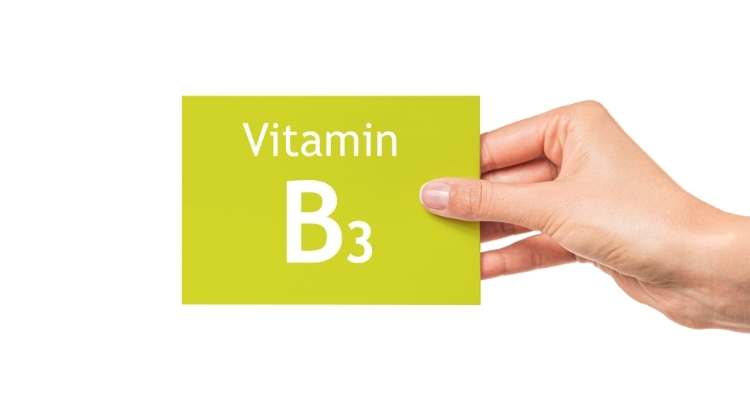What is Vitamin B3?.
Vitamin B3, also known as Niacin, is an important nutrient which is needed by every body parts to function properly. It helps in lowering cholesterol, easingarthritis, and boosting brain function.Vitamin B3 is water-soluble so your body can excrete excess amounts of the vitamin if it is not needed. Read this blog to know more Health Benefits of Vitamin B3.
Niacin is one of the eight B vitamins which comes mainly in two forms:
- Nicotinic acid: It is a form of niacin which is used to reduce cholesterol levels and lower your risk of heart disease.
- Niacinamide or nicotinamide: It doesnot lower cholesterolrather; it helps in treating psoriasis and reducing your risk of non-melanoma skin cancer.
How Does Vitamin B3 Work?.
Niacin helps converting food into energy by aiding enzymes. It is a major component of NAD and NADP, two coenzymes involved in cellular metabolism. Also, it plays an essential role in cell signaling and making and repairing DNA.
Deficiency of Vitamin B3 causes:
Following are the symptoms of Niacin deficiency:
- Memory loss and mental confusion
- Depression
- Fatigue
- Headache
- Diarrhea
- Skin problems
How Much Do You Need?.
Depending on your age and gender, intake of Vitamin B3 should only be under medical supervision. Given is the RDI for Niacin:
Infants
0–6 months: 2 mg/day
7–12 months: 4 mg/day
Children
1–3 years: 6 mg/day
4–8 years: 8 mg/day
9–13 years: 12 mg/day
Adults
Men (14 years and older): 16 mg/day
Women (14 years and older): 14 mg/day
Pregnant women: 18 mg/day
Lactating women: 17 mg/day
Health Benefits of Vitamin B3 (Niacin):
1. Lowers LDL Cholesterol–Vitamin B3 is used to treat high cholesterol and it can lower levels of “bad” LDL cholesterol upto great extent.
2. Increases HDL Cholesterol – Niacin is well-known to raise “good” HDL cholesterol.
3. Lowers Triglycerides – Vitamin B3 lowers triglycerides by 20–50% by stopping the action of an enzyme that is involved in triglyceride synthesis. Overall, intake of Niacin lowers the production of both LDL and very low-density lipoprotein (VLDL).
4. Regulates Digestion – Vitamin B3 helps in functioning of human digestive system, promoting a healthy appetite and glowing skin.
5. Helps Preventing Heart Disease–Niacin helps reducing oxidative stress and inflammation and its effect on cholesterol may help prevent heart attack and stroke. Niacin is known to dilate the blood vessels and improve blood flow.
6. Helps Treating Type 1 Diabetes – Niacin could help protect insulin-creating cells in your pancreas and even lower the risk of type 1 diabetes.
7. Boosts Brain Function – To get energy, your brain needs niacin as a part of the coenzymes NAD and NADP. Vitamin B3 supplements are often used to treat disorders like anxiety, depression and bipolar disorder.
8. Improves Skin Function–Whether Niacin is applied as a lotion or used orally, it protects skin cells from sun damage. Also, it prevents some types of skin cancer. B3 vitamin is multi-tasking thus helps healing wounds, strengthening skin and stimulating its power to retain moisture.
9. Reduces Symptoms of Arthritis– Niacineases some symptoms of osteoarthritis, improves joint mobility, and reduces the need for nonsteroidal anti-inflammatory drugs.
10. Treats Pellagra – Niacin deficiency causes pellagra, a disease marked by dementia, diarrhea and dermatitis.
11. Treats Diabetes –Vitamin B3 helps in treating diabetes and high blood sugar levels.
Sources of Vitamin B3:
Niacin is found in a variety of foods like fish, meat, poultry, nuts and legumes. There are few energy drinks as well which are loaded with B vitamins.
Given is a list of food items which are rich in Niacin (Vitamin B3):
- Liver–It is one of the best natural sources of niacin. Whether it is about beef liver or chicken liver, it is incredibly nutritious andhave protein, iron, choline, vitamin A and B.
- Chicken Breast–It is a good source of both niacin and lean protein and an excellent choice for low-calorie, high-protein diets that are designed for weight loss.
- Tuna – It is a good source of niacin and high in protein, vitamin B6, vitamin B12, selenium and omega-3 fatty acids.
- Salmon – It is also a good source of niacin and omega-3 fatty acids which can reduce the risk of heart disease and autoimmune disorders.
- Pork–It is one of the best food sources of niacin and thiamine, also known as vitamin B1 which are key vitamins for your body’s metabolism.
- Peanuts–It is one of the best vegetarian sources of niacin, which is also rich in protein, monounsaturated fats, vitamin E, vitamin B6, magnesium, phosphorus and manganese.
- Avocado–Rich in fiber, healthy fats, vitamins and minerals; Avocado is a great source of Niacin which may also help reduce your risk of heart disease.
- Brown Rice – In addition to niacin content, brown rice is high in fiber, thiamine, vitamin B6, magnesium, phosphorusand selenium.
- Whole Wheat – High in niacin, the whole-wheat products are easily digested and absorbed.
- Mushrooms–These are a good option for vegetarians or vegans looking for natural sources of niacin.
Common side effects of Niacin supplements:
- Niacin flush: Supplements may cause a flush on the face, chest or neck that results from blood vessel dilationand you may experience a tingling, burning sensation or pain.
- Liver damage:Niacin treatment for cholesterol may cause liver damage.
- Blood sugar control: Large doses of niacin are linked to impaired blood sugar control
- Eye health:Blurred vision are the other rare side effects of high dosage of Niacin.
- Gout: Niacin can increase levels of uric acid in your body which leads to gout.
Safety and Side Effects of Vitamin B3:
If you consume Niacin in the amounts found in food, there is no danger at all. Sometimes, supplemental doses can have various side effects including vomiting, nausea and liver toxicity.

